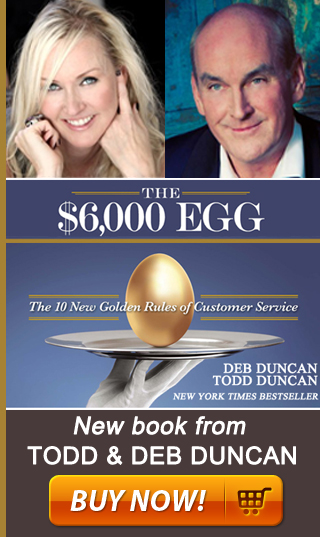High Trust Selling: The Law of the Hourglass |
Jan.8 |

By Todd Duncan
The Law of the Hourglass
You Must Make Your Moves Before Your Time Runs Out
It’s your turn. The pressure is on. The sand in the hourglass is falling fast. Your mind is racing, trying to determine your next move. Even if it is just a game, you don’t like to lose. And right now the game hangs in the balance. The outcome, however, is still in your hands. If you make your move—the right move—before the last grain falls through the narrow passage of the hourglass, your team has its best chance of coming out on top. But unfortunately, you’re a little sloppy. You’re not mindful of the time, and the last grain falls to the bottom of the hourglass before you can advance. Now the outcome of the game belongs to someone else, one of the other players who is just as eager to win.
MANAGING YOUR MOVES, NOT YOUR TIME
The Law of the Hourglass is simple to understand. It says that to win at the game of sales, to make more sales than you lose, to earn more trust than you break, you must learn to exploit the sands of time. This is true every day. Unfortunately, most salespeople don’t follow this Law. Time runs out on most salespeople every day, before they’ve made the right moves, before they’ve done what’s necessary to earn a client’s trust. And what results are shallow, short-term sales, if any sales at all. While you might blame your boss for overloading your plate, or your assistant for not keeping you in the loop, or your clients for dragging their feet, the truth is that you are the only one to blame. It is you that determines your own fate with the moves you make or don’t make. It is you that is ultimately responsible for how the game of sales is played. It’s when you fail to wisely utilize the time you’ve been given that the game is played out on someone else’s terms, with an arbitrary set of rules that you cannot control.
Your hourly rate is not only a measurement of how well you are using your time but also an indicator of your trend toward a more profitable future.
How valuable is your time? Would your clients say that the time you give them is more valuable than the product you provide? Do you work as though your time is more valuable than your product? As a salesperson, you must ascertain the value of an hour of your time if you’re ever going to learn to exploit the clock effectively. Now, I’m not suggesting that you begin charging clients by the hour for your time. But what I am telling you is that to be a highly proficient salesperson you really should establish the value of an hour of your time and, refuse to work for anything less. That’s what it takes to follow the Law of the Hourglass effectively.
THE 100 PERCENT QUESTION
What would your business look like if you could spend 100 percent of your time doing the one or two things that had the greatest impact on your profitability? I am not asking what your sales business would be like if you worked 24/7. I simply want you to start thinking about your time capacity in new terms, with fewer boundaries.
Then I want you to consider how things would be different if you were actually able to spend all of your time doing the few things that you enjoy most and that produce the greatest impact on your business. What would happen to your productivity? What would happen to your cash flow? What would happen to your client relationships? How would your best clients be served better? What would happen to your level of satisfaction? Would you have more time for life? If so, what would you do with that extra free time? How would your life be different? How would it be better?
The truth is, selling is not your life. At least it shouldn’t be. But high trust selling can give you more life if you’re willing to invest your selling hours wisely—if you’re willing to exploit the falling sand the best that you know how so that the outcome of each day remains in your hands. In fact, when you put the Law of the Hourglass into practice, it’s highly likely that you’ll be spending fewer hours at work while yielding greater benefits. That’s how high trust selling is meant to be.
comments powered by Disqus


 Follow me on Twitter
Follow me on Twitter Like me on Facebook
Like me on Facebook  Connect on LinkedIn
Connect on LinkedIn